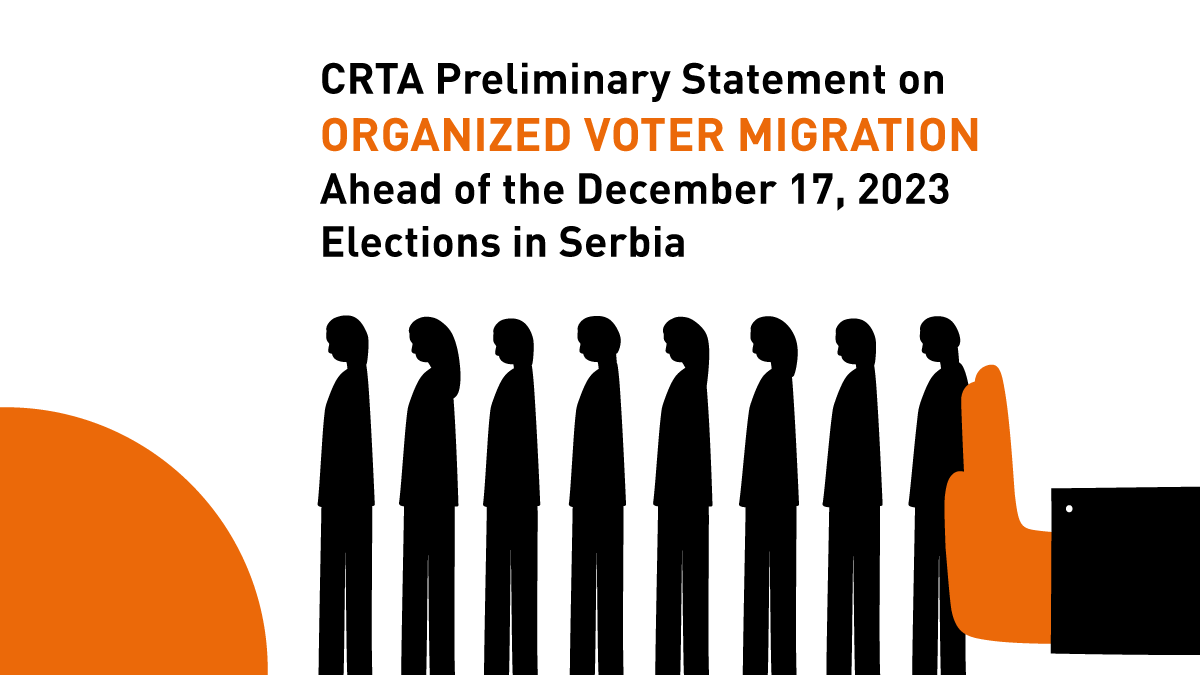The results of the Belgrade elections largely stemmed from illegal electoral engineering

Based on the information gathered and the analyses conducted thus far, the CRTA Election Observation Mission expresses a well-founded suspicion that in the elections on December 17, organized voter migrations occurred to an extent that crucially influenced the outcome of the very close elections for the Belgrade City Assembly – this is the main conclusion of the report presented by CRTA at a press conference today, which has been compiled based on material collected before, during, and after the Election Day.
Organized voter migrations represent a form of electoral engineering that is neither legal nor legitimate. By registering fictitious residences for the purpose of voting in local elections outside one’s own city or municipality, laws regulating citizens’ residencies are violated, thus endangering the principles of electoral equality and the guaranteed right of citizens to choose their local self-government.
In relation to the scope and prevalence of manipulations with the voter register, even before the elections, CRTA received information from various sources indicating illegal actions by local government bodies and the highest state authorities aimed at shaping the election results in Belgrade in favor of the ruling party.
Crucial evidence was gathered during the Election Day by CRTA observers who made numerous photo and video recordings of organized transportation of voters from other cities in Serbia and abroad to Belgrade. Multiple points serving as logistical centers of the operation were recorded, from where voters were directed and transported to polling stations in various parts of the capital. CRTA observers identified instances of organized transportation of voters, supervised voting, possible identity manipulation of voters in 71 polling stations, or 14 percent of polling stations in Belgrade, notably in Čukarica (10), Novi Beograd (9), Vračar (7), Voždovac (7), and Zemun (7).
It was noted that voters were organized to arrive from various parts of Serbia (e.g., from Pančevo, Valjevo, Čačak, Aranđelovac, Smederevo, Vršac, Novi Sad, etc.), as well as from Kosovo, Bosnia and Herzegovina, and Croatia, intensifying suspicion that local elections were strategically scheduled in only a third of local self-governments to enable temporary voter migrations.
Additional analyses conducted after the Election Day used and cross-referenced quantitative data from publicly available electronic versions of the voter register on the website of the Ministry of Public Administration and Local Self-Government (names and surnames of voters by polling stations) and the voting results. Significant alterations in the voter register over a one-year period were identified. Polling stations in Belgrade, with a high probability of being destinations for organized voter migrations, where the number of votes for the ruling party significantly increased compared to previous elections, were identified.
Certain political actors indirectly confirmed the findings of these analyses – several politicians and high officials from Serbia and Bosnia and Herzegovina explicitly confirmed the implementation of the mentioned practices, attempting to justify and present them as legal and legitimate.
CRTA has made a series of recommendations to prevent unacceptable practices that marked the elections in Belgrade. In the short term, it is essential for the Ministry of Public Administration and Local Self-Government to make the voter register entirely public, along with reasonable and feasible measures to protect voters’ personal data.
Additionally, prosecutors must investigate all well-founded suspicions of criminal acts related to the elections.
In the medium term, the Ministry of Public Administration and Local Self-Government should conduct an independent audit of the Unified voter register in line with the OSCE/ODIHR Mission’s recommendations. The National Assembly should enact changes to the election laws to prevent organized voter migrations.
The full report can be found here.








